Learn About the Health Benefits of Nuts Shaped Like Brains.
Walnut is also known as the “Royal Nut”.

Walnuts are rounded, single-seeded stone fruits produced by the walnut tree that are commonly consumed. During the ripening process, the husk becomes brittle and the shell hardens. The shell encloses the kernel or meat, which is typically divided into two halves separated by a membrane. The seed kernels, commonly known as shelled walnuts, are protected by a brown seed coat rich in antioxidants. Antioxidants protect the oil-rich seed from atmospheric oxygen, preventing rancidity.
In 2020, the global production of walnuts (in shell) was 3.3 million tonnes, with China accounting for 33% of total production.
Walnuts, like other tree nuts, need to be processed and stored properly. Poor storage exposes walnuts to insect and fungal mould infestations, the latter of which produces aflatoxin, a potent carcinogen. A batch containing mold-infested walnuts should be completely discarded.
used it in wedding rituals². During the Middle Ages, walnut trees grew throughout Europe and were known as the “royal nut” in the Byzanti
Walnut is termed as Royal nut because of its historical and cultural significance. According to some sources, the scientific name of walnut, Juglans regia, means “glands of Jupiter” or “nut of Jupiter” in Latin¹³. The Romans loved the walnut as a symbol of the deity Jupiter and his power¹³. They also believed that the walnut had sexual powers and used it in wedding rituals². During the Middle Ages, walnut trees grew throughout Europe and were known as the “royal nut” in the Byzanti
Ideal temperature for storage
Walnuts should be stored at -3 to 0°C with low humidity for long-term storage in both industrial and home settings. However, such refrigeration technologies are unavailable in developing countries where walnuts are produced in large quantities; walnuts are best stored at temperatures below 25 °C and with low humidity. Temperatures above 30 °C and humidity above 70% can cause rapid and significant spoilage losses. Walnut meats are available in two varieties: with and without shell. Due to processing, the meats may be whole, halved, or cut into smaller portions.
Culinary usage
All walnuts can be eaten raw (toasted or pickled) or as an ingredient in a dish, such as walnut soup, walnut pie, walnut coffee cake, banana cake, brownie, or fudge. It is also popular as an ice cream topping, and pieces are used as garnish on some dishes.
Nutritional Profile of Walnuts
Walnuts without shells contain 4% water, 15% protein, 65% fat, and 14% carbohydrates, which include 7% dietary fibre (table). Walnuts contain 2,740 kilojoules (654 kcal) and are high in several dietary minerals, particularly manganese (163% DV), as well as B vitamins.
Unlike most nuts, which are high in monounsaturated fatty acids, walnut oil is primarily composed of polyunsaturated fatty acids (72% of total fats), particularly alpha-linolenic acid (14%), and linoleic acid (58%), with oleic acid accounting for 13% of total fats.
https://www.instagram.com/reel/CrH0qvGsAOg/?utm_source=ig_web_copy_link&igsh=MzRlODBiNWFlZA==
Is this safe to eat while pregnant?
It is generally safe to eat walnuts while pregnant. They contain a high concentration of omega-3 fatty acids, which aid in brain function and neurological health. They are also high in protein, vitamins, minerals, and antioxidants, which are all necessary for a healthy pregnancy and baby development. It contains folic acid, which is essential for pregnant women and helps prevent many birth defects. Expectant mothers can give their child an early start by popping just 4-5 kernels per day.
These are high in neuroprotective compounds such as vitamin E, melatonin, folate, and the essential Omega 3 fatty acids. All of these directly improve cognitive functioning, which includes memory, attention, concentration, reasoning, and creativity.

Nourishing Nutrients: An expectant mother enjoys the wholesome goodness of walnuts, rich in essential fats, protein, and vitamins. These brain-shaped wonders provide vital nourishment for both her and her growing baby
https://healthyfibres.com/product/walnuts/
Benefits of Eating Walnuts During Pregnancy
- Rich in omega-3s. These nuts contain omega-3 fatty acids, which are beneficial to both mother and fetus. Fatty acids stimulate brain cell activity while also aiding in foetal vision development.
- Heart-healthy: Walnuts contain arginine, which relaxes blood vessels and increases blood flow. It thus reduces the risk of high blood pressure and regulates cholesterol levels in the body.
- Rich in antioxidants.
These nuts contain powerful antioxidants such as quinone, juglone, tannins, tellimagrandin, copper, and vitamin E, which protect the mother-to-be and foetus from free radical damage. Eating these may boost immunity and increase protection against infections. - High in folate.
These are the best source of folic acid, which helps with the development of the baby’s brain and neurological system. It also reduces the risk of neural tube defects and congenital malformations in the baby. - Helps induce sleep.
Melatonin is essential during the third trimester, when sleep becomes a major concern. Walnuts stimulate this hormone in your blood, which promotes proper sleep and rest. - Protective against depression.
It is natural to feel emotional and depressed during pregnancy. Walnuts and walnut oil are valuable sources of omega-3 fatty acids, particularly alpha-linolenic acid, which helps improve the physical and emotional wellness of the mother-to-be. - Assists in managing excessive weight gain.
- These are high in protein and fibre, which help to satisfy your hunger quickly. They will keep you full for a longer period of time, and may even help prevent significant weight gain.
- It is Copper-rich nut which promote red blood cell production, tissue repair, and foetal growth and development.
It can be consumed raw or roasted. They can be chopped and sprinkled on salads and are widely used in desserts. Muesli with walnuts and raisins is a very nutritious breakfast choice. Walnuts can be added to any type of stuffing. Candied walnuts are frequently used as a topping for ice cream and brownies, adding extra crunch. Walnuts can also be finely ground and mixed into dips and chutneys. Roasted walnuts are a great addition to any trail mix or nutrition bar. You can even use cold-pressed walnut oil to dress your salads.

